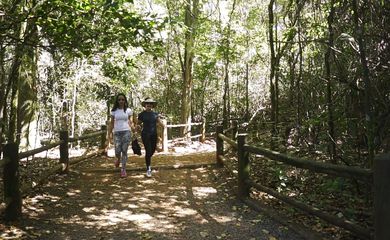Tourism in Brazil could benefit from climate agenda

Different tourism sectors are coming together to create itineraries aligned with the climate agenda in Belém, Pará state, combining experiences of immersion in the forest, and regional cuisine, and promoting sustainable production systems. The idea behind the initiatives is to take advantage of the opportunities brought by sustainable tourism—such as attracting investment and increasing competitiveness—and also to overcome the challenges in bringing together the major players from the two agendas.

Parys Fonseca, an entrepreneur in the lodging sector, has created a business model combining the experience of immersion in the Amazon rainforest with sustainable lodging. After consulting the Brazilian Micro and Small Business Support Service (Sebrae) in Pará, he learned about a recyclable modular structure which not only has less environmental impact at a lower cost, but also keeps room temperatures stable without artificial refrigeration.
“The installation process was really quick. In just two weeks I was renting it out as accommodation. And I thought it was better because the work was simpler, the module adapts to the environment, and it’s also thermoacoustic,” he pointed out.
Located on Murucutu Island, one of the 42 islands that make up the city of Belém, Fonseca’s resort offers visitors not only a chance to spend a night’s sleep immersed in the Amazon rainforest, but also gastronomic experiences with local products from the region’s sustainable production chain. “The next step is to create a route for tourists to learn about açaí palm production, just as there’s route on cocoa on Combu Island. Sebrae is supporting me with training and management, which has been key for the local residents and entrepreneurs alike,” he said.
According to the managing director of Sebrae in Pará, Rubens Magno, the choice of Belém as the venue for the 30th United Nations Conference on Climate Change (COP30) in 2025 brought the agendas in the region closer together more quickly.
“The event highlights the importance of the Amazon and encourages discussions on sustainable practices and adaptation to climate change. This raised awareness among investors and public managers about the need to integrate sustainability into tourism activities, promoting a more responsible model in line with global climate goals,” Magno noted.
The ties between these various players in tourism and sustainability and a clear climate agenda for the sector were underscored in a diagnostic report drawn up by the National Tourism Council, for the development of the Climate Adaptation Plan for Tourism. On the other hand, sustainable tourism also offers opportunities, such as partnerships attracted by the win-win approach, in addition to strategies to add value to destinations.
The report was one of the tools used to prepare the National Tourism Plan for 2024–2027. In addition to establishing the guidelines for actions aimed at making Brazil “the country that receives the most tourists in South America by 2027.”
According to the Ministry of Tourism, these principles will be incorporated into all 20 of the plan’s programs, which were unveiled during the 8th edition of the Tourism Salon: Get to Know Brazil, held in Rio de Janeiro.






